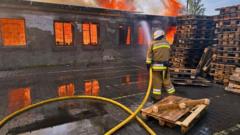As Russia escalates its military aggression with record drone and missile attacks against Ukraine, geopolitical implications arise from shifting U.S. political responses, notably from President Trump’s recent statements and promises of resumed military aid.
Intensifying Conflict: Russia's Escalation in Ukraine Amid Political Shifts

Intensifying Conflict: Russia's Escalation in Ukraine Amid Political Shifts
Russia's recent drone attack highlights ongoing tensions as U.S. political dynamics shift under former President Trump's criticism of Putin.
Russia's military offensive against Ukraine intensified this week with a record number of drone and missile strikes, coinciding with renewed criticism of President Vladimir Putin from former U.S. President Donald Trump. The Ukrainian military reported that Russia launched 728 explosive drones and decoys in a single night, emphasizing Ukraine's urgent need for increased weaponry. This escalation occurred shortly after Trump declared that the U.S. would resume military shipments to Ukraine, reversing his previous stance.
Despite Trump's pointed remarks about the futility of Putin's peace initiatives, experts suggest that the Kremlin remains unfazed. Sources allege that Putin perceives an advantage on the battlefield, believing that Ukraine's defenses could falter in the near future. “He will not compromise his objectives in Ukraine for better ties with Trump,” noted a political analyst, indicating a trend of continued Russian aggression regardless of external diplomatic pressure.
Furthermore, political movements in the U.S. appear to be aligning against Russia, with a prominent Senate Republican signaling progress towards new sanctions targeting nations that buy Russian oil. This evolving situation underlines the complex interplay of military, political, and economic factors surrounding the conflict, as both local and global actors navigate the repercussions of ongoing hostilities in Ukraine.





















